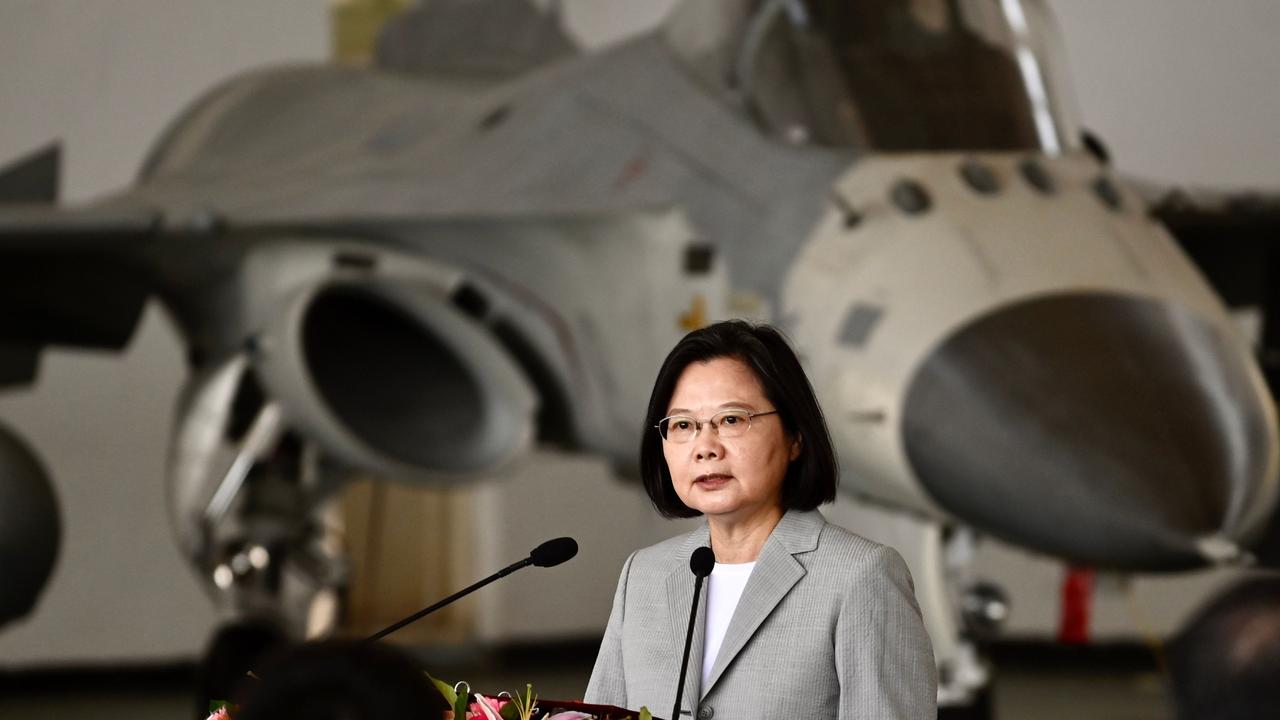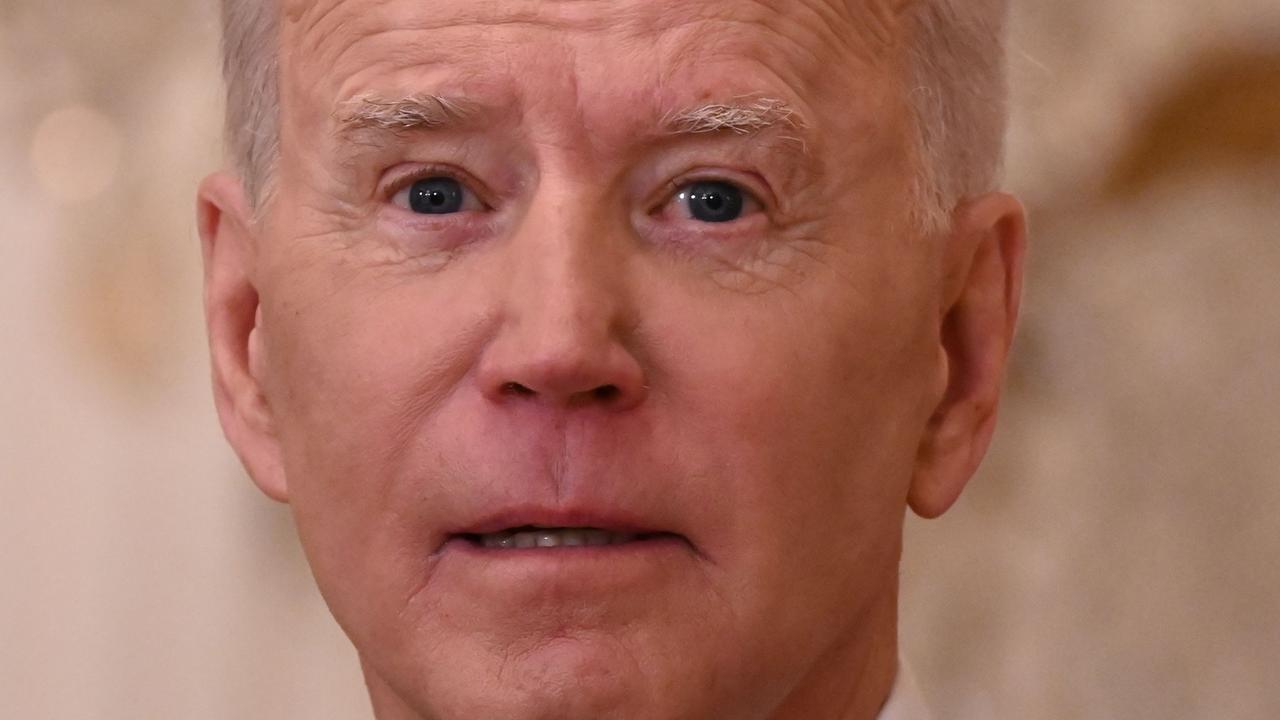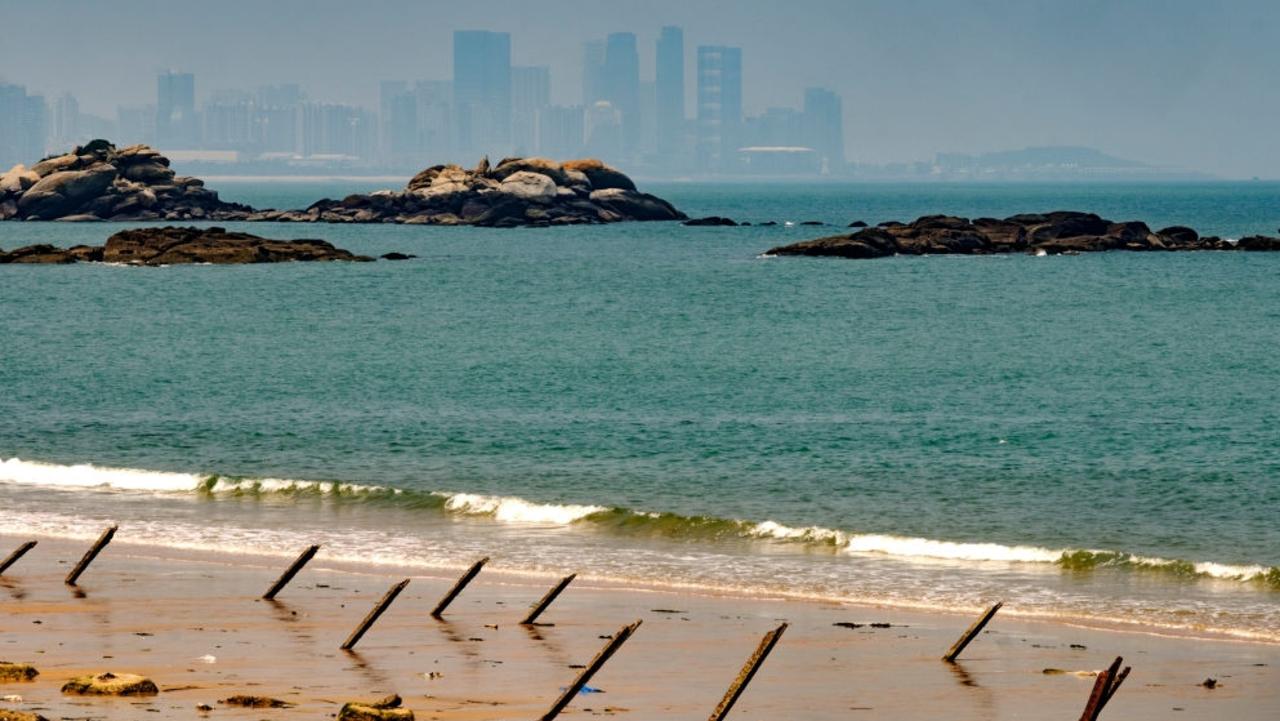Australia could be called on to defend Taiwan from China
Over open airwaves during Beijing’s biggest ever “air raid” this week, a pilot showed China’s hand. The boast is bad news for Australia.
“This is all ours,” a Chinese combat pilot declared over the open airwaves as 10 warplanes surged into Taiwan’s air defence identification zone on Monday.
Just days earlier, an unprecedented 20 fighters, bombers and surveillance aircraft encircled the beleaguered island democracy in reaction to a US diplomat simply visiting Taipei.
As Beijing relentlessly ramps up the pressure against this last bastion of non-Communist China, America’s chargé d‘affaires in Canberra has hinted Washington expects Australia to participate in Taiwan’s defence.
Michael Goldman on Wednesday told the Australian National University’s Rory Metcalf that Washington was integrating Australia into its “strategic planning” for potential regional conflict.
And there’s plenty of contingencies to plan for.
There’s North Korea. There’s the South and East China Seas. There’s Taiwan.
20 PLA aircraft (Y-8 ASW*2, KJ-500 AEW&C, H-6K*4, J-16*10, J-10*2 and Y-8 RECCE) entered #Taiwan’s southwest ADIZ on Mar. 26, 2021. Please check our official website for more information: https://t.co/KdPmWCid1Zpic.twitter.com/OFKTMsNXC3
— 國防部 Ministry of National Defense, R.O.C. 🇹🇼 (@MoNDefense) March 26, 2021
“There’s a lot of focus on overt, crude military intervention,” Mr Goldman told the National Security podcast.
“I’d just like to say that we’re focused on that, of course … But then we’re also concerned with all sorts of other aspects of coercion that don’t quite reach the level of a military invasion. You can think of all sorts of things ranging from a blockade to cyber incursions to, you know, lobbing missiles over the island …”
But Beijing continues to harden its resolve to seize control of its island neighbour. On March 7, Foreign Minister Wang Yi again insisted the one-China principle to be a “red line that must not be crossed”. He reiterated that the Communist Party would “never compromise on the Taiwan question”.
RELATED: Australia ‘defenceless’ against China’s new bomber
Now, everything hinges on what Chairman Xi Jinping’s actual designs towards this last vestige of China’s 1949 Civil War are.
Rigidly controlled state media, however, may offer a clue.
The People’s Liberation Army (PLA) is “continuing to increase its combat preparedness by making its routine exercises more complex and realistic and taking possible US and Japanese interventions into consideration”, the Global Times reported Tuesday.
It added that recent military exercises had proved the PLA could “lock down the island entirely from possible interventions by US and Japanese forces”.

Holding the line
Beijing has been racing to build itself a military capable of taking on the US – and winning.
Some believe that goal may already have been achieved.
Communist China’s navy, air force and marine units have begun openly flexing their new-found muscle. And they’ve just scored a major victory.
Taiwan this week suspended efforts to intercept every provocative probe of its borders. Its limited number of aged aircraft have been succumbing to wear-and-tear. Its pilots are showing the strain of relentless pressure.
Several recent fatal accidents have been an almost inevitable consequence.
Instead, Taipei will rely upon “painting” overflying Chinese warplanes with military radars as a suitable reinforcement of territorial claim. But this also will give the PLA a wealth of technical intelligence on how to counteract those radars.
Recent deals with the US to modernise Taiwan’s F16 fleet have come too late to avert this backdown. As has a resolution to increase its missile defence capabilities dramatically.
RELATED: China accused of gaslighting over maritime militia
“We are bound by a moral obligation and also a matter of legislation to help Taiwan with its legitimate self-defence needs,” Mr Goldman said of Washington’s Taiwan Relations Act.
Prof Metcalf then asked if there were expectations Australia would participate in Taiwan’s defence.
“I think we’re committed as allies to working together not only in making our militaries interoperable, and, you know, functioning well together, but also in strategic planning,” Mr Goldman replied. “And when you look at strategic planning, it covers the range of contingencies that you’ve mentioned, of which Taiwan is obviously an important component.”

‘Imminent’ peril?
Admiral Philip Davidson, chief of the US Indo-Pacific Command, warned a US Senate Committee in February that China might try to seize Taiwan within “the next six years”.
His soon-to-be successor, Admiral John Aquilino, was blunt. “My opinion is this problem is much closer to us than most think,” he said.
He said Beijing’s recent “aggressive actions” suggested its growing military strength had emboldened it. “We’ve seen things that I don’t think we expected,” he told the committee. “That’s why I continue to talk about a sense of urgency. We ought to be prepared today.”
RELATED: US Coast Guard sent to South China Sea to ‘free up shooters’
It’s a message resonating in Canberra’s halls of power.
Australia has revised its defence strategic outlook, citing the emergence of an increasingly “more dangerous”, “disorderly” international environment. It’s now boosting military spending by some $270 billion over the next decade.
But not all international affairs analysts are convinced at the immediacy of the threat.
East-West Center senior fellow Denny Roy argues Beijing has other things on its mind.
“To be sure, the PRC threat to Taiwan has grown steadily, and the trends are still adverse,” he writes.
“For Taiwan and its friends, however, the situation is not as dire as portrayed by those warning that Beijing will soon opt for war.”
Former CIA East Asian Affairs analyst John Culver has told the Brookings Institution think-tank that there is more at play than appears on the surface.
“I disagree with the tone and import of recent public pronouncements by Davidson,” Mr Culver states.
“They convey that China has a fixed timeline and agenda for compelling Taiwan, whether based on some assumption that as soon as the PLA is ‘ready’ China will launch an invasion. Or that the CCP will launch an opportunistic war to shore up domestic legitimacy. None of this is true.”

Balancing act
Beijing’s strength is growing. Washington’s is waning.
Both need to test where the scales of balance sit constantly.
“The real danger is that all of the factors that tended to preserve the status quo … have eroded and are likely to continue to erode,” Mr Culver argues.
Most notably, this includes the military balance — which has recently swung in China’s favour.
“But in many ways that’s the least consequential change in and of itself because even now, China is not building the invasion fleet,” he says.
Taiwan, he says, isn’t an issue of territorial control.
It’s an issue of Communist Party legitimacy.
“That has meant that CCP policy toward Taiwan is largely about what it wants to avoid, not what it wants to achieve,” Mr Culver says. “I’m not predicting or forecasting that war won’t happen. I’m just saying that war isn’t ‘the plan’ for the CCP.”
Mr Roy argues the balance of military power isn’t a simple matter of like-for-like comparison.
It’s about whether or not it can readily achieve its objectives. False confidence and premature action are part of what brought Napoleon and Hitler to their knees.
“Even with the PLA’s improved capabilities, military action against Taiwan is an extremely risky proposition for China,” Roy writes. “An attempted invasion across the strait would involve the largest and most complex amphibious operation in history, and this by a military with no significant combat experience since 1979 when it performed badly in a border war against Vietnam.”

Unfinished business
The autocratic Republic of China (ROC) government fled to Taiwan in 1949 to escape the victorious Communist revolutionary army. Chairman Mao was unable to consolidate this victory when the US intervened, warning that any attempt to cross the Taiwan Strait would be met with force.
By this time, Washington was engaged in a proxy war with Beijing in North Korea. And while Communist forces were able to force General Douglas MacArthur’s troops into a long retreat, they could not confront the US at sea.
In the eyes of Communist Beijing, democratic Taipei represents “unfinished business”.
The move that NASA listed Taiwan as a "country" on its website is against international consensus on the one-China principle and hurts Chinese people's feelings, said Zhu Fenglian, a spokesperson for the State Council Taiwan Affairs Office on Wednesday. https://t.co/o6J9bCFVKzpic.twitter.com/oFp0Y7ZAGn
— China News ä¸å›½æ–°é—»ç½‘ (@Echinanews) March 31, 2021
Now Chairman Xi appears to have committed himself to unite the mainland and island by force if necessary. And as the Chairman-without-a-time-limit enters his third term, he may feel compelled to cement a prominent place in Chinese history.
But Mr Roy argues such a threat isn’t imminent.
“For domestic political reasons, China is extremely unlikely to embark on a war of choice against Taiwan in the next year,” he writes.
In February 2022, Beijing will host the Winter Olympics. It’s an event in which the Communist Party has invested much political and economic capital.
Then, in October 2022, Chairman Xi will automatically transition into his third term as CCP general secretary.
“A cross-straits war will ruin this party,” Mr Roy opines. “It is hard to imagine Xi starting an unnecessary war with Taiwan prior to his reappointment because of the high risk that war-related economic and even political turmoil would erode Xi’s popularity”.

Tense times ahead
“A war scare, rather than actual war, remains the optimal policy for the PRC,” Mr Roy believes. “The top leadership may see it as a chance to ‘win without fighting’, and it demonstrates to the Chinese masses and potential political rivals that the Xi government is doing something.”
This is why the immediate outlook is for yet more tough talk from Beijing, he says.
The midterm outlook is much less clear.
RELATED: Tensions at ‘maximum’ as Beijing warns of confrontation
History shows war is a tempting fallback for autocrats struggling to keep the lid on domestic troubles. It offers a distraction. It’s a way to channel nationalism to overwhelm internal dissent.
Which is why Mr Culver believes Chairman Xi isn’t under any real pressure to act.
Yet.
“President Xi Jinping and the CCP are not facing much domestic pressure to do something, or at least to do something different,” he says. “But galvanising Chinese public opinion to justify harsher policies is a card Beijing could always play. We should keep in mind that it has not.”
But times are changing.
“Especially since Xi in 2019 and more recently has framed ‘reunification’ as a requirement for achieving the ‘China Dream’,” Mr Culver warns.
This, he says, is tied to the CCP’s ambitions for 2049 – the 100th anniversary of the Chinese Civil War. “We should worry that Xi may decide to take risks that his more constrained predecessors since Mao Zedong would not.”
As time passes, he says, this risk will grow.
“At some point in the not-too-distant future, perhaps 2030 or 2035, the PLA probably will have the organisational and warfighting capacity for a Taiwan operation that it has always lacked,” Mr Culver warns.
“China will probably be the largest economy, and an even more dominant trading and advanced manufacturing powerhouse. Weakness could no longer be an excuse for an increasingly nationalistic population that has only known China’s rise.”
Jamie Seidel is a freelance writer | @JamieSeidel




